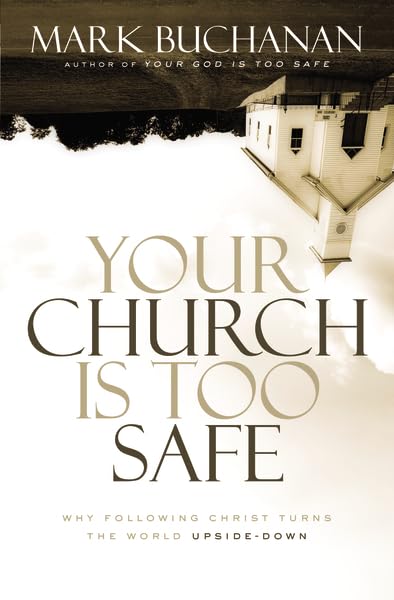Your Church Is Too Safe: Why Following Christ Turns the World Upside-Down
Written by Mark Buchanan Reviewed By Mike McKinleyAlmost every pastor and church leader would like for their congregation to more effectively engage their community. The obstacles to that kind of engagement are numerous-indifference, fear, legalism, and non-engaging methodologies render churches ineffective in mission and irrelevant to those they are trying to reach. In Your Church Is Too Safe, Mark Buchanan diagnoses the “enormous gap between the life Jesus offered and the life we're living” (p. 9) and offers a rousing call to those who “want more from the church and for the church” (p. 10). Buchanan, a pastor in western Canada, draws on personal experiences and stories from Scripture to paint a picture of what a church could do if it was willing to love the lost the way Jesus loved them.
Your Church Is Too Safe has much to commend it. Buchanan repeatedly calls the church to sacrifice, grow, and change in order to love and serve lost people. His compassion for the lost is helpfully matched by the clarity of his observations about why Christians (including himself) are so often inept and tone-deaf when it comes to reaching the world around them. The book regularly challenged me, encouraged me, and motivated me to give myself more fully to seeing my own congregation live up to its scriptural calling.
Most of the eighteen chapters are structured either around an event from Scripture (e.g., Jonah's reluctance to go to Nineveh; the men in Mark 2 who dig a hole in the roof to get to Jesus) or a teaching of Jesus (e.g., the parable of the talents in Matt 25). These Scriptures serve as organizing illustrations for the points that Buchanan wants to make about reaching the world-for example, we must love as God loved, and we must put God's good gifts to use in the service of others. Buchanan also fills each chapter with vivid and arresting personal stories that show the power of the gospel to overcome sin and transform people's lives.
In the hands of a less down-to-earth writer, a book like this could be wearisome or discouraging to Christians who want to share their lives with the people around them but have little hope that it is possible. Buchanan is, however, very engaging. His humility and sense of humor draw the reader in. He perceptively anticipates his reader's objections; I occasionally found myself forming an objection only to have the author clarify his statement helpfully. The book doesn't scold the reader for their failures but inspires them with the author's compassion for the lost, love for the church, and desire to honor Christ.
But while a book like Your Church Is Too Safe deserves a generous reading (i.e., not blaming the author for not accomplishing what he didn't set out to do), a few concerns prevent me from recommending it wholeheartedly. First, the author's use of Scripture is at times problematic. A prophecy of end-time peace and blessing from Zech 8, for example, is held up as “the dream of every church” (p. 79) and a description of what happens when churches are faithful. While that prophecy may be applicable in some ways to the church, the author fails to do sufficient work to show how it may or may not apply to the believer's experience before Christ's final return.
In addition, the author sometimes reads questionable significance into the details of a story from the Bible. Thus for Buchanan, Abraham's standing in the doorway of his tent in Gen 18 is an example of how believers should inhabit two worlds: comfortable at home but still facing the world (p. 98). The fact that James and John were leading the way as Jesus walked along (Luke 18:39) is a warning to believers that we should not put ourselves forward (p. 198). While I don't disagree with the point the author is trying to make more generally in either of these instances, the points do not follow from the texts he cites.
Finally, though I appreciated the author's accessible style, I found myself at several points looking for more nuanced and careful thinking. At one point Buchanan advocates churches collaborating with secular groups, including marching in a parade with gay rights activists (p. 110). While one can appreciate the instinct towards tearing down barriers and showing kindness and grace, the book lacks a careful consideration of the downsides of such collaboration. Should Christians be at all concerned about the danger of appearing to give approval to groups that oppose God and his Word? How much time should a church spend on things that do not directly relate to the preaching of the gospel? What is the difference between the responsibility of the church and the responsibilities of individual believers? I wish Buchanan had addressed some of these issues.
In conclusion, there is much in this book to receive and appreciate. Its heart is absolutely in the right place. But its usefulness is, unfortunately, limited by the concerns described above.
Mike McKinley
Mike McKinley
Guilford Baptist Church
Sterling, Virginia, USA
Other Articles in this Issue
Telling the Story from the Bible (Part 2): Reviewing The Big Picture Story Bible and The Jesus Story
by David A. ShawChildren's story bibles are not Bibles and, it turns out, neither are they for children...
This article is written in love and admiration for pastors in North America...
As I write this the UK Parliament is considering Clause 1(1) of the Marriage (Same Sex Couples) Bill...
I shall begin with a well-known exegetical conundrum and then branch out to a much larger issue that none of us can afford to ignore...







